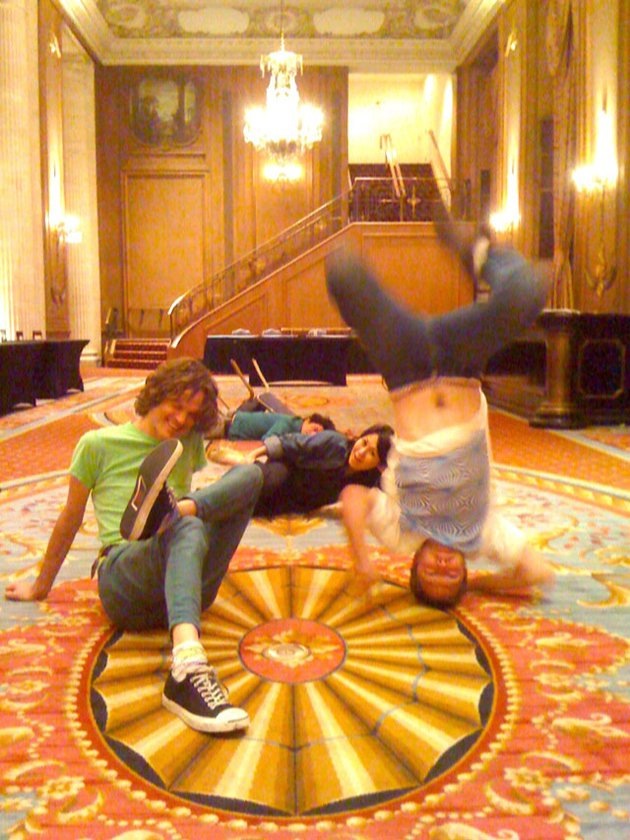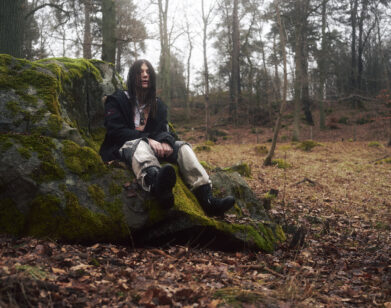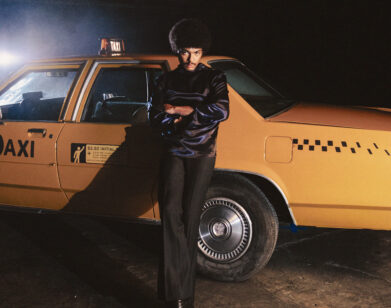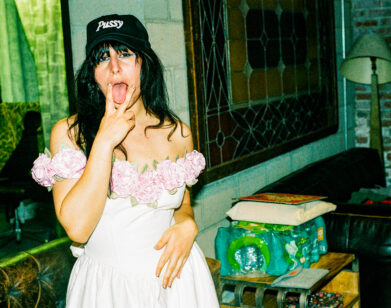Deerhoof Does Parties

A conversation with all four members of the perennially thrilling avant-pop outfit Deerhoof can be a little like one of their Dadaist albums: a crazy quilt of sounds, stories, images, and anecdotes; you never know what direction you may be headed next. We discovered as much recently, as John Dieterich, Satomi Matsuzaki, Ed Rodriguez, and Greg Saunier sat down to talk about Breakup Song, Deerhoof’s twelfth album since 1997, out this week.
Despite that title—in part an allusion to the fact that the formerly San Francisco-based band’s members are now living in different parts of the country, New York, Albuquerque and Portland—the new release is relentlessly upbeat. They call it a “party record,” with song titles including “We Do Parties” and “Fête d’Adieu” (“Goodbye Party”), though it’s peppered with splitsville-oriented lyrical hooks: “let go, leave it all behind.” Deerhoof’s insatiable taste for experimentation has extended to the visuals this time around: last week, when we spoke to them, they had just released a half hour-long video for the entire Breakup Song album, shot at night in New York on a handheld miniature camera, as well as four short films by each of the members. In a roller-coaster conversation over cups of barley tea at Matsuzaki’s Brooklyn home, we learned how that beverage might be used to illustrate the spirit of the new album, what garbage trucks have to do with all-night parties, and how, 15 years after its first album, this very special band continues to win new fans.
JOHN NORRIS: So guys—the name of this record, Breakup Song. To what extent does that refer to the fact that you are all living in far-flung places now? And how long has this been the case with the band?
ED RODRIGUEZ: We’ve all lived apart for like, two years now?
SATOMI MATSUZAKI: More than that.
GREG SAUNIER: I mean we haven’t lived in the same house for…
RODRIGUEZ: Like three years. That was crazy. The bunk beds? The four-layer bunk beds?
NORRIS: [laughs] Where was that?
RODRIGUEZ: No, we never really did that. I think if we had, there would have been an album called Breakup Song much earlier.
[laughter]
JOHN DIETERICH: Yeah, like midnight of the first night.
SAUNIER: That’s what it’s like, though. That’s what touring is like! [laughs] Although I always brag how DIY we are, that we take a rental car and we’ve never actually stepped into a tour bus, that kind of thing. But actually, if you think about it, a tour bus is—I mean, we at least stay in separate rooms a lot of times. Tour bus, it’s like staying in the same house.
NORRIS: So really the band has been living in different places for quite a while, John?
DIETERICH: Yeah, I moved to New Mexico a couple of years ago. But it’s not like our process as a band is really that different. You know, we write alone and then we bring stuff to each other. This album was a little bit more extreme in that we spent months apart sending things to each other back and forth, and if we were actually living in the same city, we might have actually showed things to each other in person. So it complicated things to a certain degree, but it’s not that different.
NORRIS: At least compared to the last record, Deerhoof Vs. Evil, this one is more upbeat. Not that the last one wasn’t, but it also had its jazzier, more lounge-y kind of moments, whereas this one, almost start to finish, has a super high energy…
SAUNIER: What does he mean, “almost”? [laughs]
NORRIS: Oh, that’s just because I qualify and equivocate all the time.
SAUNIER: Well, you were sort of right that the title, that Breakup Song sort of has to do with the fact that we’re apart, but it isn’t necessarily just physically that we’re apart. You know it’s just, we never really got along much in the first place. [laughs] Or had any similar ideas about what a band should sound like, so, you know, it’s always been broken up you know basically from day one. So it’s just about that partly, the constant disagreement, the bitter squabbles. [laughter] I don’t have a TV, but sometimes we get on planes. And between the movies, they’ll play commercials. And so I see commercials. Do you guys ever see this?
DIETERICH: I can safely say I’ve seen that.
SAUNIER: And in American commercials in the past year or two, I don’t know, the singers all sound like they’re whining and the music’s all melancholy. It’s sort of like, I hear these commercials and it makes me feel sad, you know? Like—for instance, my barley tea is gone. Now, there’s music out there that encourages you, when your barley tea has run out, to just sort of sit there and be like [sighs] “My tea ran out. Oh, man.” And just be slouching. It’s partly about posture.
DIETERICH: It’s all about the barley tea. You probably don’t know that genre.
SAUNIER: Exactly! See he’s backing me up. Okay, cool. So we wanted to make music that when your tea runs out, instead you’re like, “I’m gonna go get some more tea!” You know? It just gives you the energy.
MATSUZAKI: What if there were no more tea in the world?
RODRIGUEZ: Oh my God. That’s the next record.
SAUNIER: [laughs]
RODRIGUEZ: [sings] “And no more barley tea…” [laughs] “We’re gonna get some!”
NORRIS: Well, Barley Tea would hardly be any odder a title than half or Deerhoof’s…
SAUNIER: [laughs] Hey! What are you talking about?
RODRIGUEZ: I just bought 25 shares of barley tea. We’ve just been talking about it so much…
SAUNIER: [laughs] Come on, you guys are missing my point. My point is that it was meant to be motivational, we thought it would be interesting—when you have a breakup, or when you have hard times with your honey, you know, hard times in life, you can feel sad about it, or you can sometimes, take a dark time and make it, like, what’s the word—how do you measure light? Magnitude. One—one candle—power? Come on, man.
DIETERICH: One lumen?
SAUNIER: Lumen! One lumen nicer, you know what I mean? It still may be a little dark for a while, but still you know, one lumen nicer. Whereas the music may encourage you to, “Well, you know, I still got some friends.” And let’s go meet my friends, or maybe dance, or have a nice time. And so because I’d been hearing a lot of music that would end up on online playlists with Deerhoof songs from Deerhoof Vs. Evil and all the others were these really sad country ballads, just like one song after another. Or like, fake hobo things, you know what I mean? About like, hopping trains and stuff. And I was just like “Whoa,” you know? So I like the idea of making a happy record that’s intended for breakup times. Hard times.
NORRIS: There’s a lot of nightcrawling going on in the new video that just came out, for the whole album. And Satomi, this was a friend of your who shot this?
MATSUZAKI: Yeah, my friend was following with a small camera.
SAUNIER: It looked like a cigar or something.
MATSUZAKI: Yeah, it was really tiny and light. And he was following me, and I was walking all around this area.
SAUNIER: A lot of it though is done where this camera is attached to a set of balloons, so it’s floating freely and when it’s pointing down at things, it’s sort of wobbling and it has this incredibly strange look when it wobbles. Becky James is the owner of the camera, and she is the one who came up with this idea to attach it to balloons. She spent the night walking around here and then on her way to Webster Hall for Real Estate and R. Stevie Moore. And the video ends up, you haven’t gotten to the end yet, but it ends up with her at the show, and the camera just floats up so high in the air you know, because it’s on this balloon. And you see hundreds of people, and suddenly it’s over the stage. [laughs] Frankly, I don’t know how you didn’t get thrown out of there.
MATSUZAKI: No, the bouncers were like, “Oh wow, party!” Everybody wanted to dance with me! They thought I brought the party, and they were like, “Yeah!”
SAUNIER: And then I spent the next evening kind of walking around, mostly South Williamsburg, looking for garbage trucks [laughs] because the cover of the record is a garbage truck that Satomi took a photo of just right outside her house, that was just parked out there. And I thought that turned out so cool, and so I was trying to reproduce that, but on video. And so we were just running all over the place, “Oh, there’s one!” and we’d go running but we’d never catch it. We started to develop this idea that the garbage truck, which only goes around at night and therefore has many bright lights on it, is like some like weird music party machine. It’s not exactly a karaoke machine, but kind of like one; not exactly a jukebox, but like one. And so in our imagination, garbage trucks became that thing. Because they only come out at night and they’ve got these bright flashing lights and stuff. And they always stop in a place and it’s like, “Okay, we’re gonna have our party here!” you know?
NORRIS: Yeah, usually in front of my house.
SAUNIER: [laughs] Right! At like three in the morning.
NORRIS: It’s really something that this band, with one lineup or another, has been an entity for as long as it has—and not just staying together, but continually making really excellent, exciting records. I find a lot of Deerhoof fans are often super fans. And I think among those people who love you, there is sometimes a feeling of like, “Why is Deerhoof forever at bridesmaid status?”
[laughter]
NORRIS: Do you know what I mean? Or do you not really give thought to stature?
SAUNIER: For us, it’s not so much about stature, it’s more about venue size, number of records sold, those things do make a difference. I mean, so far the response we’ve gotten has always been more than we expected.
DIETERICH: And it’s funny but I—hopefully this won’t sound corny—but when I went and saw Deerhoof play before I joined the band, I was just like “This is the best band, and I want to be in this band.” You know what I mean? It’s one of those things where I had this feeling that I wanted to proselytize regardless of whether I joined the band, I wanted people to hear about Deerhoof, and for me it was really important. And I still have that feeling, although it’s different playing in the band. And it is still exciting to me that people have an interest.
NORRIS: And even 12 albums on, there may be people still just discovering the band with this record.
SAUNIER: Of course.
RODRIGUEZ: Online, everywhere, people are still shocked to discover us. They’ll hear something and write to us and we’ll give them some info on the band and they cannot believe that they hadn’t come across it before. I think all of us are still, have never left that sort of stage where we’ll be headlining like a large room, and we’ll get there and the doors won’t be open yet, and we’ll look up and be like “Oh my God, I hope people come.” And we’ll just get ready backstage and come out and it’ll be full, and that has never gone away—that feeling of, “Wow, people are here!”
BREAKUP SONG IS OUT NOW. FOR MORE ON DEERHOOF, VISIT THE BAND’S WEBSITE.






